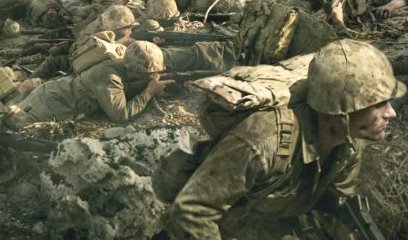After a riveting two minutes of war veterans and their loved ones recounting their post-war experiences, part ten of HBO’s epic miniseries “The Pacific” throws the viewer directly into the end-of-war relief felt by the U.S. Marines. Although the episode begins with the end of the war, the viewer is intriguingly taken through the post-war lives of Robert Leckie and Eugene Sledge. Although fresh off being engaged in some of the most brutal warfare known to history, one is shown how difficult a simple conversation can be for soldiers like Leckie. Simple tasks like sleeping soundly are nearly impossible for the war-torn veterans whose minds are shredded with the memories of the brutality they experienced in the Pacific Theater.
Soldiers come home and instantly look to the safety of family, to the love of a significant other, or even to the comfort of familiar places like an old bedroom or a house. In one sense this serves as a reminder to non-military personnel, that we ought to never take for granted the comfort and security of the small things in life.
Looking back across the 10 parts of the miniseries, it is no surprise that readjusting to civilian life is such a difficulty. Recalling some of the gruesome killings and horrid tasks the soldiers committed, it is no wonder they face difficulties. This difficulty is shown within Sledge’s question, “Why did I end up back here when all those other fellas didn’t?” This is the question which all of the surviving soldiers ask themselves, and it is the source of great consternation. Unfortunately the only solution to this tormenting question is the advice offered by Sidney Phillips, “You’ve just gotta pull yourself out of bed in the morning, and get on with the day. You do that enough times in a row, you forget some things…for a while anyway.” The truth is there is no answer to the question, at least not one that can satisfy the gut-wrenching feeling these brave soldiers had to live with every day. Routine was all that was left.
Executive Producers Tom Hanks and Steven Spielberg leave us with sound words, that no matter how much we try to understand what was experienced by those soldiers, we can “never understand what men like that went through.” As the miniseries concludes with updates as to the whereabouts of these brave soldiers, we are left with enough food for thought to last a lifetime, and, hopefully, enough compassion to think before we speak about issues so grave and so unknown as what was experienced by soldiers who fought and died for our liberty in the pacific.







